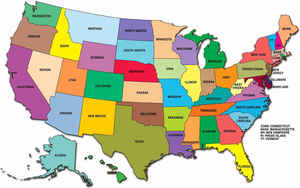Alabama State Symbols
Alabama State Symbols, Emblems, and Mascots

Alabama offers students with a variety of recreational activities on the white sand beaches of the Gulf Coast or in the crisp air and serene beauty of mountains to the north. Students in Alabama can visit one of the several rock formations where Native Americans lived long ago, or see the Natural Bridge Rock, the longest natural bridge east of the Rockies.
Alabama does not have an official nickname, but is known as the "Heart of Dixie." Alabama has also been known as the cotton state and the yellowhammer state. Alabama entered the union as the 22nd state in 1819. The name 'Alabama' is derived from an Indian word meaning "thicket clearers." Alabama has been at the center of many American battles--between white settlers and Native Americans, and between the North and South in the Civil War. The capital is Montgomery, and state wild flower is the oak-leaf hydrangea and the state flower is the Camellia.
Alabama State Symbols contains descriptions and pictures of the state symbols, emblems, and mascots of the state of Alabama, which can be quickly accessed. This resource guide represents many of Alabama state facts such as the state flower, the state gemstone, the state insect, the state tree, the state bird, the state animal, the state flag that flies over Alabama, and the capital, as well as many more symbols, emblems, and mascots.
The items on the list have been officially sanctioned by the Alabama Legislature. Alabama has over 40 official state emblems. The oldest of which is the Alabama State Bible, from 1853; the most recently designated is the peach, Alabama's state tree fruit, established in 2006. The state has no official nickname, although "Heart of Dixie" was strongly promoted by the Alabama Chamber of Commerce in the 1940s and 1950s, and put on state license plates.
In 2002 the phrase "Stars Fell on Alabama" began to appear on license plates. It refers to the night of November 12, 1833, when a fantastic meteor shower seen across the Southeast caused this night to be known as "the night stars fell on Alabama."The shower created such great excitement across the state that it became a part of Alabama folklore and for years was used to date events. A century later it inspired a song and book.







